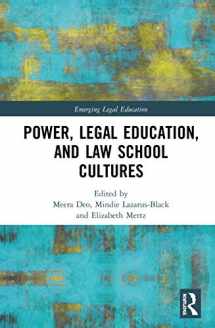
Power, Legal Education, and Law School Cultures (Emerging Legal Education)
Book details
Summary
Description
There is a myth that lingers around legal education in many democracies. That myth would have us believe that law students are admitted and then succeed based on raw merit, and that law schools are neutral settings in which professors (also selected and promoted based on merit) use their expertise to train those students to become lawyers. Based on original, empirical research, this book investigates this myth from myriad perspectives, diverse settings, and in different nations, revealing that hierarchies of power and cultural norms shape and maintain inequities in legal education.
Embedded within law school cultures are assumptions that also stymie efforts at reform. The book examines hidden pedagogical messages, showing how presumptions about theory’s relation to practice are refracted through the obfuscating lens of curricula. The contributors also tackle questions of class and market as they affect law training.
Finally, this collection examines how structural barriers replicate injustice even within institutions representing themselves as democratic and open, revealing common dynamics across cultural and institutional forms. The chapters speak to similar issues and to one another about the influence of context, images of law and lawyers, the political economy of legal education, and the agency of students and faculty.


We would LOVE it if you could help us and other readers by reviewing the book
Book review



